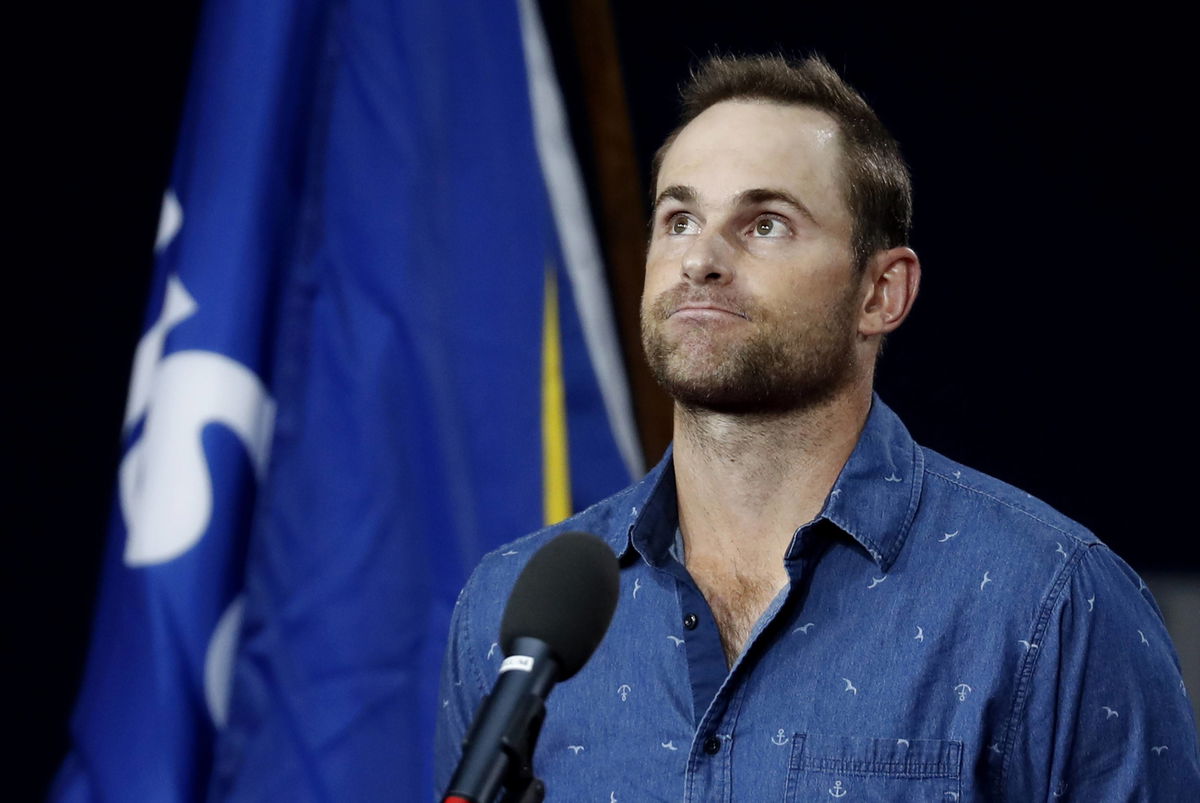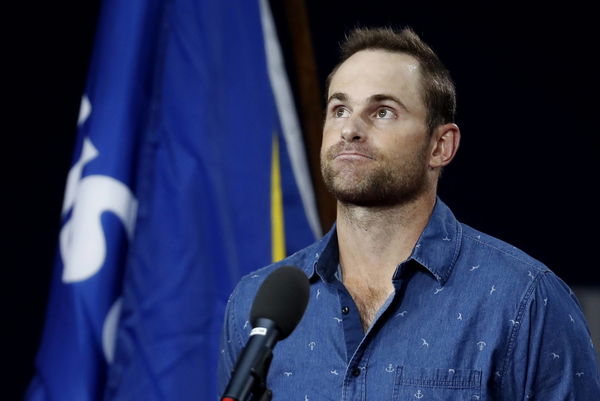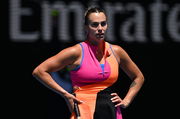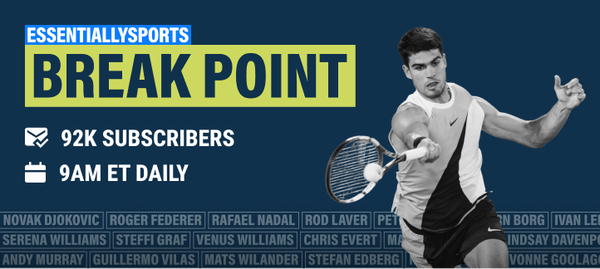
Imago
Former tennis player Andy Roddick speaks during the International Tennis Hall of Fame ring presentation ceremony before a semifinal match in Arthur Ashe Stadium at the 2018 US Open Tennis Championships at the USTA Billie Jean King National Tennis Center in New York City on September 7, 2018. PUBLICATIONxINxGERxSUIxAUTxHUNxONLY NYP20180907112 JOHNxANGELILLO

Imago
Former tennis player Andy Roddick speaks during the International Tennis Hall of Fame ring presentation ceremony before a semifinal match in Arthur Ashe Stadium at the 2018 US Open Tennis Championships at the USTA Billie Jean King National Tennis Center in New York City on September 7, 2018. PUBLICATIONxINxGERxSUIxAUTxHUNxONLY NYP20180907112 JOHNxANGELILLO
“Gambling is a cancer to society,” read a comment when Andy Roddick announced his partnership with Betway back in August 2023. The former world No. 1 revealed he’d joined the betting giant as their global tennis ambassador, promising expert takes and columns for Betway’s “Insider” platform. On paper, it sounded harmless, just analysis and insights from a retired pro. But fans weren’t convinced. Many felt uneasy seeing one of tennis’s most respected names step into gambling territory.
Watch What’s Trending Now!
Fast forward to now, and Roddick is once again in the spotlight. But this time, defending his decision to work with betting sites while the larger debate over gambling’s grip on sports keeps heating up. He was in the midst of a discussion regarding the ATP’s expanding relationship with betting companies on a recent episode of his podcast, Served. Jon Wertheim, his co-host, exposed the hypocrisy of the sport’s alleged “data deals.” Wertheim stated that “anytime you see a data deal, that’s just a euphemism for we’re making a deal with a sportsbook.”
He asked why the ATP gladly signs multimillion-dollar contracts with gambling sponsors while players are prohibited from doing so. Andy Roddick didn’t dodge the topic. In fact, he admitted he had worked with Betway for two years.
ADVERTISEMENT
“I am not clean of any of this,” he said honestly. “I didn’t give gambling picks. I basically took a—it’s not dissimilar to what I do here, where you give an overview of a tournament and they use it. So I wasn’t making specific picks; I wasn’t, you know, tilting betting lines or anything. Me saying, “Carlos Alcaraz, I think he’s one of the favorites at Wimbledon,” isn’t really, I would assume it’s not changing much.”

Imago
Former tennis player Andy Roddick speaks during the International Tennis Hall of Fame ring presentation ceremony before a semifinal match in Arthur Ashe Stadium at the 2018 US Open Tennis Championships at the USTA Billie Jean King National Tennis Center in New York City on September 7, 2018. PUBLICATIONxINxGERxSUIxAUTxHUNxONLY NYP20180907112 JOHNxANGELILLO
He did, however, draw attention to how strictly regulated these alliances were: coaches, captains, and anyone connected to players were prohibited from participating. He claimed that podcasters were the only people left to provide a tournament summary.
ADVERTISEMENT
But beyond defending himself, Roddick also challenged the bigger system. He questioned where all the money from these ATP “data deals” actually goes. He further added that he believes it’s going to the Challenger Tour or to infrastructure.
He further questioned, ” How much is going to go there…., or is that going to go to pockets?” His point was simple: if the ATP can take gambling-related money under the banner of “innovation,” then there should be clarity about how it benefits the players who make the sport run.
ADVERTISEMENT
For context, last year, the ATP signed a six-year partnership with Sportradar through its Tennis Data Innovations (TDI) division. The deal gives Sportradar access to official match data for both betting and analytics. The ATP claims it has led to a 60% increase in Challenger Tour prize money since 2022. But as Roddick and Wertheim discussed, the picture isn’t entirely clear.
In defending himself, Andy Roddick has drawn a line between promoting gambling and talking about tennis on a betting-owned platform. But the real question is, governing bodies like the ATP, WTA, and ITF strike massive sponsorship and data deals with betting firms because they bring in millions. However, officials, coaches, and athletes are prohibited from betting in any way.
ADVERTISEMENT
ITIA cracks down on tennis betting offenses
Players who violate the sport’s anti-corruption regulations have faced harsh penalties from the International Tennis Integrity Agency, including multi-year bans and hefty fines. Lauro Milanovic, a Croatian player, was given the harshest punishment for his match betting and refusal to assist investigators: an eight-year suspension and a $10,000 fine.
The ITIA found that Milanovic, who is currently unranked, had placed 15 winning bets on a match involving a close associate back in 2018. After initially denying any involvement, he later refused to provide access to his phone or respond to formal requests for evidence. His suspension runs until May 2033, though he has appealed the ruling.
Top Stories
Australian Open Under Fire After Ball Kids Treatment Sparks Outrage From Tennis Icon

Aryna Sabalenka Makes Feelings Clear on Elina Svitolina Snubbing Handshake at Australian Open

Aryna Sabalenka Warns Chair Umpire After Controversial Call at Australian Open: “Really Pissed Me”

Juan Carlos Ferrero Makes Bold Statement on Reuniting with Carlos Alcaraz

Elena Rybakina Makes Honest Admission About Controversial Coach’s Impact Amid Australian Open Success

In another case, Uzbekistani player Rakhimbek Ibrakhimov was suspended for 21 months and fined $5,000 after failing to cooperate with an ITIA investigation into suspicious matches from 2022. The 22-year-old, who reached a career-high singles ranking of 1550, earned just $1,710 in career prize money. Based on the ITIA, Ibrakhimov ignored numerous interview demands and missed a rescheduled hearing. His ban will be until April 2027.
ADVERTISEMENT
The Court of Arbitration for Sport (CAS) also suspended Melina Ferrero, an Argentine player, on 12 counts of supplying and 12 counts of betting, on the argument of match-fixing, for a three-year suspension. The panel found the sustained course of misconduct between 2017 and 2018, comprising not reporting corrupt practices, and being paid to do poorly, and found it to have been perpetrated by Ferrero.
Until July 2027, she will not be eligible and will pay a fine of $15,000. The ITIA, an independent organization established to protect the integrity of tennis, makes it an offense where all three players cannot attend or take part in any event that is hosted by the ATP, WTA, ITF, or the federation of national tennis in their countries of origin when they are in suspension.
ADVERTISEMENT
ADVERTISEMENT
ADVERTISEMENT
